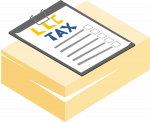New York LLC Taxes
A New York LLC will automatically be taxed as a pass-through entity. In other words, the LLC won’t pay federal taxes directly. Instead, the revenue the LLC earns passes through the business to you. Then, you’ll report your share of the profits on your personal tax return. Your income will be taxed at the federal self-employment rate of 15.3%—12.4% for social security and 2.9% for Medicare. However, New York also has a personal income tax and state sales tax, which will vary depending on where your New York LLC conducts business and how much annual revenue your business generates.
In this article, we'll cover:


How Are New York LLCs Taxed?
A single-member LLC (SMLLC) is automatically taxed as a sole proprietorship whereas a multi-member LLC is automatically taxed as a partnership. There are a couple of federal tax forms that LLCs with default status need to file:
- Single-member LLC—Form 1040 (usually Schedule C, but some SMLLCs file C-EZ, E, or F)
- Multi-member LLC—Form 1065
If those options don’t feel right, a New York LLC can also decide to be taxed as an S-corp or C-corp. We’ll provide more details below.
New York LLCs taxed as S-corp
Some LLCs will benefit from electing S-corp tax status. If you want to do this, file Form 2553 with the IRS. S-corps are taxed as pass-through entities, just like LLCs with default tax status. However, there are important differences. For one thing, LLCs taxed as S-corps are allowed to make distributions to their members that aren’t subject to the 15.3% self-employment tax, which can help attract investors. In addition, there’s no requirement that S-corps pay a federal corporate tax, though they are subject to New York’s corporate income tax.
Before deciding S-corp tax status is a good idea for your business, it’s best to get advice from a CPA and make sure your New York LLC meets the IRS requirements for S-corps as well as state requirements.
S-corps file Form 1120-S to report their income to the IRS.
LLCs taxed as C-corp
LLCs can also elect to be taxed as a C-corp, which is the default tax status for corporations. Why do some LLCs find this option attractive? C-corps are often eligible for greater tax deductions than pass-through LLCs, which can save your business some money.
However, very few LLCs make the choice to elect C-corp status. A CPA can sit down with you and help you decide if the C-corp designation makes sense for your situation. C-corps must pay the 21% federal corporate income tax and New York’s corporate tax.
C-corps file Form 1120 with the IRS.

New York State Income Tax
New York has a state income tax. The rate individuals pay starts at 4% and tops out at 10.90% based on income.
LLCs taxed as pass-through entities need to pay something known as an annual filing fee. The filing fee ranges from $25 to $4,500 based the LLC’s gross income in New York.
Most LLCs with S-corp status must pay a fixed dollar minimum tax. The amount paid is based on New York receipts. The chart below has details.
| New York receipts | Fixed dollar minimum tax amount |
| $100,000 or less | $25 |
| $100,001 but not over $250,000 | $50 |
| $250,001 but not over $500,000 | $175 |
| $500,001 but not over $1,000,000 | $300 |
| $1,000,001 but not over $5,000,000 | $1,000 |
| $5,000,001 but not over $25,000,000 | $3,000 |
| Over $25,000,000 | $4,500 |
Finally, there’s C-corp status. If your LLC elects C-corp status in New York, you’ll pay a corporation franchise tax based on the highest of three tax bases: business income base, business capital base, and fixed dollar minimum. Your business must run the numbers and get a value for all three tax bases, then pay whatever is highest. Don’t make any assumptions about which one you think you’ll pay.
The business income base is either 6.5% or 7.25% for most C-corps. Unless your business made an income of more than $5,000,000, you should expect to pay 6.5%. The base amount is based on your federal taxable income after state-approved deductions.
For general business taxpayers, the business capital base is 18.75% of the total business capital in New York after deducting asset-related liabilities. The capital tax is also limited to the first $5,000,000.
Finally, there’s a fixed dollar minimum tax. The fixed dollar minimum is also based on state receipts.
|
State receipts amount |
Tax |
|
$100,000 or less |
$25 |
|
$100,001 but not over $250,000 |
$75 |
|
$250,001 but not over $500,000 |
$175 |
|
$500,001 but not over $1,000,000 |
$500 |
|
$1,000,001 but not over $5,000,000 |
$1,500 |
|
$5,000,001 but not over $25,000,000 |
$3,500 |
|
$25,000,001 but not over $50,000,000 |
$5,000 |
|
$50,000,001 but not over $100,000,000 |
$10,000 |
|
$100,000,001 but not over $250,000,000 |
$20,000 |
|
$250,000,001 but not over $500,000,000 |
$50,000 |
|
$500,000,001 but not over $1,000,000,000 |
$100,000 |
|
Over $1,000,000,000 |
$200,000 |

Sales and Use Tax
Like most states, New York levies a sales and use tax on most tangible property and services. The base New York sales tax rate is 4%, though cities, counties, and school districts can add their own rates on top of that.
To find out what your local sales tax rate is, check out the New York State Department of Taxation and Finance website.

Local New York Taxes
In addition to sales tax, some municipalities charge a local tax on specific goods and services. For instance, New York City levies a sales tax of 4.5% on food and beverages sold by restaurants and caterers. New York City is also unique because it levies a Metropolitan Commuter Transport District tax of 0.375%, bringing the total sales tax rate to 8.875% in this case.
However, if you get a tattoo in New York City, you’ll only have to pay the city’s rate of 4.5%, as New York State doesn’t charge a sales tax for services like tattooing, manicures, pedicures, and massages.
Local tax laws are easy to forget about, but doing so would be a costly mistake. It’s important to always follow all the local tax laws in the city where your LLC is located, as well as anywhere else you do business.

Other Taxes in New York
Here are some other taxes levied by New York.
New York State Employer Taxes
Employers are obligated to pay unemployment insurance taxes. The lowest rate is 2.025%, while the highest rate is 9.825%. New employers will need to pay a rate of 3.4% for 2022. In New York, the new employer rate gets assigned to businesses when they first become liable and aren’t a successor to a previously liable company. Unemployment insurance taxes are due each quarter.
You must also pay workers’ compensation insurance. You can purchase workers compensation insurance through the state, a private insurance carrier, or, if you meet the financial requirements, by becoming self-insured. The rate for workers’ compensation will vary based on factors like the size of the business and the type of work being performed by employees.For instance, an employee who sits at their desk all day will cost less to insure than an employee working on a construction site.
If you can’t find workers compensation insurance through a private carrier, then the New York State Insurance Fund can guarantee your business coverage.
Industry Taxes
The New York Department of Taxation and Finance also places taxes on certain industries. Here are specific industries that must pay an additional tax.
- Cigarettes and tobacco products
- Adult-use cannabis products
- Beverage container deposits
- Authorized combative sports tax
- Alcoholic beverages
- Wireless communications surcharge
- Waste tire management fee
- Taxicab and hail vehicles
- Manufactured home parks registration
- Mortgage recording tax
- Opioid excise tax
- Paper carryout bag reduction fee
- Highway use tax
- Metropolitan commuter transportation mobility tax
- Pari-mutuel tax
- Petroleum business tax
- Real estate transfer tax
- Special assessments of hazardous waste
- Stock transfer tax
- Vapor products tax

Do foreign LLCs in New York need to pay New York taxes?
Yes. Although foreign LLCs are LLCs that were initially formed in another state, but conduct business in New York, the state still requires most entities (including New York foreign LLCs) to pay all applicable taxes. So, regardless of where you started your business, you’ll need to check with your local city and county to see what taxes you’ll need to pay each year.





